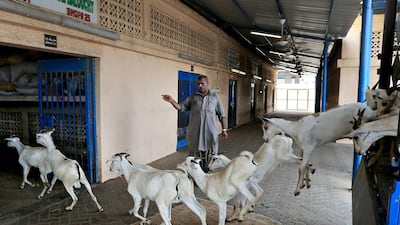ABU DHABI // A livestock shortage has caused prices to skyrocket at the Animal Market in Mina Zayed.
As animal traders have faced supply shortages for about four months, this has led to price increases and hampered sales as well.
According to local traders, a shortage of highly sought-after Iranian Jaziri sheep has caused the price of other sheep to rise.
With the summer heat and high ocean tides keeping small cargo ship offshore, Kashmiri and Indian sheep are also not being traded.
“Jaziri and Kashmiri are not coming here nowadays,” said livestock trader Rahim Ullah. “It’s been four months that we haven’t had Jaziri and for two months we haven’t received Kashmiri sheep.
“These two varieties keep the market rolling but when their supply is affected it causes the price of all other livestock, like goats and sheep, to rise,” Mr Ullah said.
“In the absence of Jaziri sheep, now we are buying local goats at higher prices.”
Mr Ullah, a Pakistani who owns Al Salsabil Catering, said he hoped the market would stabilise after Eid Al Fitr when demand decreased.
A 10-kilogram Jaziri or Kashmiri usually sells for Dh450, he said. These days, however, the price is nearly double at Dh800. Somali sheep, he said, which were obtained in Dubai, were selling for Dh600 for 15kg. Three months ago they were Dh350.
Najdi and Naeemi sheep, which are raised locally, are Dh850 for a 12kg animal. Their price four months ago was Dh650. Local goats are going for Dh800 for 12kg, about Dh200 more than usual.
The increased prices has drawn numerous complaints from customers wanting to buy goats for Eid Al Fitr. Goats weighing less than 10kg have tender meat and are considered good so their prices are competitive.
Abdullah Al Hashimi, an Emirati who bought four local goats for Eid, paid between Dh750 and Dh800 after much bargaining.
“We always prefer local goats as they are checked by veterinarians and free from any disease,” he said. “But due to a shortage of Jaziri and Kashmiri sheep in the market, prices shot up and we have to cough up more for them.”
Mr Al Hashimi said he was able to buy at a lower price because he was friends with the trader. “If you go to Baniyas livestock market, it could cost you Dh1,000 or more.”
Trader Daulat Khan was selling old Kashmiri sheep. An 18kg animal was Dh600, while two months ago it would have cost Dh450.
“These are old sheep that I got more than four months back and weigh too much. People don’t like them,” said the Pakistani who runs Mohammed Salem Mohammed Livestock & Sheep Trading Establishment. “Nothing is coming from India and Iran now.”
Nisar Afridi wanted two Somali sheep but could not get a lower price.
“I’ll get two and slaughter them at my garage in Mussaffah and start barbecuing with friends after Eid prayers,” he said. “We slaughter them ourselves and cut them into pieces, then all our 12 friends who gather there celebrate.”
The municipality, however, discourages home slaughtering and encourages people to use government slaughterhouses.
The Department of Municipal Affairs said up to 55,000 animals would be slaughtered by the end of Eid.
The Abu Dhabi Farmers’ Services Centre, meanwhile, has increased its supply of fresh local meat to retail outlets to meet the increased demand.
anwar@thenational.ae

